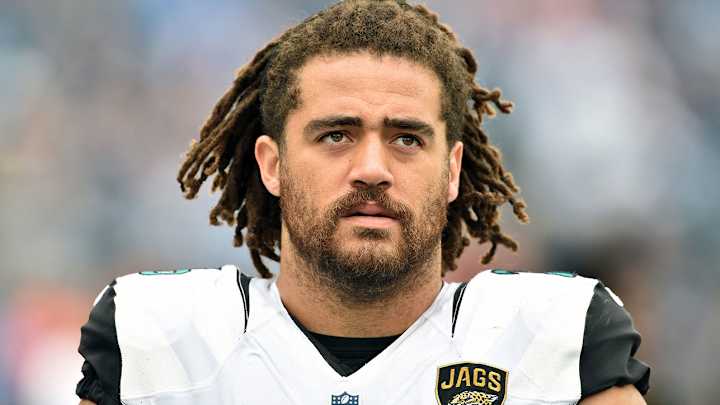Football, the Flag and the Right to Speak Our Minds

BY JARED ODRICK
I was reminded this month of James Baldwin’s enduring words from a 1965 televised debate with William F. Buckley Jr., the conservative author who opposed the civil rights movement and denied the existence of systemic racism. Baldwin described the mind-set of those empowered by the system, saying, “The Mississippi or Alabama sheriff, who really does believe, when he’s facing a Negro boy or girl, that this woman, this man, this child must be insane to attack the system to which he owes his entire identity.”
For a black child in America, Baldwin continued, “it comes as a great shock around the age of five, or six, or seven, to discover that the flag to which you have pledged allegiance, along with everybody else, has not pledged allegiance to you.”
I thought of this when 49ers quarterback Colin Kaepernick sat, and then knelt, during the national anthem to protest racial oppression. He was soon joined by teammate Eric Reid, the Seahawks’ Jeremy Lane, the Broncos’ Brandon Marshall and several others. What most fascinated me was the backlash. Beyond the vitriol—Twitter users wished a concussion upon Marshall—many pointed to the wealth these men have accrued as football players and thought them insane for challenging the system. But consider what we have seen on our paths.
I can do a franchise-friendly interview in my sleep, but when we step outside the bounds of third-down efficiency we are told to keep quiet.
We are handpicked from an unpaid labor pool that purports to provide an education in exchange for services rendered, though the value of that education pales drastically compared to overall football revenue for institutions of higher learning. Ignoring our value is a prerequisite for turning pro, so we pledge allegiance to the sport in lieu of a free market and keep our heads down.
As an NFL player, I’ve asked myself on multiple occasions, Do I want to speak the truth or do I want to make money? (Marshall lost an endorsement deal for protesting.) The league pays lip service to the notion that its athletes are valued as conscientious community members. Our platform is wasted if media relations staffers constantly nudge us to stay within the confines of “we gave 110% and we have to get better.” I can do a franchise-friendly interview in my sleep, but when we step outside the bounds of our third-down efficiency, we are vilified and told to keep quiet.
This offseason I told myself I would pursue interests beyond the game and explore avenues of expression that had been closed off as I fought to make it in the NFL. Social injustices can’t be ignored.
As Americans we’ve forgotten that we’re supposed to loathe falling in line. So-called renegades shouldn’t be embraced only after decades have passed and their causes deemed by historians to be acceptable or inevitable. Muhammad Ali challenged our country in fundamental ways while captivating audiences with his skill in the ring. He is viewed now as a cultural warrior, when in reality he lived as a pariah in his prime.
Many weren’t willing to embrace a black man who lived on his own terms and rejected the status quo. He was supposed to be grateful for his celebrity and be an example for all the little black boys and girls to pull themselves up by their bootstraps, make no excuses and ask no questions about their condition. Our nation was one of the last first-world powers to abandon traditional chattel slavery, and we are likely to be the last to overcome its consequences.
Colin Kaepernick’s motives are genuine and truthful but, for the most part, have been rejected on the basis of his method. Exercising a First Amendment right isn’t an affront to our military. The notion that the flag is sacred and untouchable—or that it has pledged the same allegiance to everyone—is one of the great hypocrisies of our time.
Millions of fans tie their identities to our teams’ successes, but they don’t know the men behind the face masks. When Kaepernick bucked the system, he forced people to reflect on the constructs they’ve accepted or, worse, had never considered.
Jared Odrick is in his seventh NFL season.
Question? Comment? Let us know at talkback@themmqb.com
